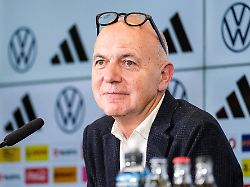30 minutes for 26 million euros
DFB completes multi-million dollar basic contract
September 29, 2023, 4:35 p.m
The basic agreement with the DFL is confirmed by the DFB Bundestag. All questions are quickly answered at the digital event. The cash-strapped association can look forward to fresh millions. He needs her urgently.
Broad majority for fresh millions: As expected, the badly hit German Football Association can look forward to a new financial blessing in the coming years. At the Extraordinary Bundestag, the delegates no longer needed much convincing; the green light for the million-dollar treatment came with an overwhelming majority of 228 votes. The new basic agreement was waved through less than 30 minutes after the start of the digital event.
The agreement with the German Football League (DFL), which is now valid until 2029, will bring the cash-strapped association an increase of around 26 million euros instead of the previous six million per year. “We achieved a good result,” enthused DFB President Bernd Neuendorf: “This applies not only to financial issues, but also to structural issues.”
In the final step, the professional side with its 36 clubs must sign off on the newly negotiated agreement at their meeting on October 9th. Instead of the previous 26 million euros, the DFL will now pay the DFB between 34.5 and 39 million euros per season. In contrast, the DFB is paying 12.5 million euros instead of the previous 20 million in order to be able to advertise with the clubs’ national players. In European Championship or World Cup years for the men’s senior national team, the DFB has to transfer two million more to the DFL.
Is it really 26 million more for the DFB?
However, as the “SZ” reports, tax law and a restructuring within the DFB may have unpleasant consequences. Accordingly, in the old structure, the association was able to record the income as tax-free and at the same time claim the payments to the DFL for tax purposes. That’s why the DFB didn’t take in 6 million euros, but around 12 million euros. Since last year, however, the DFB has had to tax the league’s payments normally. According to the association of tax experts, the bottom line is that there are only around six million euros more than before. The DFB told the newspaper that this calculation “fundamentally produces correct results”.
The road to an agreement was particularly rocky when it came to finances, and there was a long threat of escalation. At the beginning of the negotiations, Neuendorf sensed that there was “antagonism” instead of “constructive cooperation.” DFL supervisory board boss Hans-Joachim Watzke even threatened the DFB with legal action. There was talk of going to arbitration or even breaking with the DFB because the DFL didn’t want to meet the supposedly “exorbitant” demands from the amateur camp.
DFB continues to cut costs, but higher subsidies for amateur football
It was not until the end of June that both camps reached an agreement – just a few days before the previous basic agreement expired. “It was of course a very difficult process in times of limited financial resources,” said Watzke afterwards: “But everyone involved was always aware of the shared responsibility for German football.” Neuendorf positioned itself similarly. “This basic agreement is an important building block to sustainably strengthen and promote football at the grassroots level,” said the DFB President.
At the beginning of the year it became public that the association’s financial difficulties were even greater than expected. The new building of the campus, which opened last year, costs 30 million euros more than previously known (180 instead of 150 million), the structural deficit and renewed tax inconsistencies had caused further economic damage. In addition, the running costs for the campus are significantly higher than expected at around 18 million euros per year.
In addition to all of this, there was now the dismissal of national coach Hansi Flick, the commitment of his successor Julian Nagelsmann and the commitment of the new managing director Andreas Rettig. A director for the women is also still being sought. Although Neuendorf does not want to give any specific figures, these personnel decisions were certainly anything but cost-effective. The DFB had already prescribed strict austerity measures.
According to treasurer Stephan Grunewald, the 21 regional associations are not affected by the cuts; instead, the subsidies for amateur football will increase as a result of the new basic contract. The broad approval is hardly surprising.
